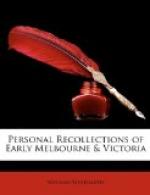I was not personally very intimate with any of the Henty family, otherwise I might have had more to say in this sketch. But I have met most of the brothers repeatedly, and frequently I met James, the Melbourne merchant, who was the eldest, and also William, the lawyer and ex-Premier of Tasmania, a most amiable and gentlemanly man, who latterly resided at Home, where he died, and who often attended the lectures and discussions at the Royal Colonial Institute of London. Both of these brothers were rather grave and quiet, while Edward and Stephen were energetic and lively even beyond most colonists. Francis, now the only survivor of the large family, I met only once, about forty-three years ago, in the Western District. He was then a handsome and rather slim young man, not of the Henty mould, which was rather of the full John Bull kind, as “Punch” gives him, minus the obesity. But if I may credit the Melbourne “Illustrateds” in a recent likeness of the last of the Victorian founders, he must have consented, in later life, to drop more into the family mould. They were a family of eight sons and one daughter. Seven of the sons emigrated with their father. They were all men of mark, above average in mind and physique—men of a presence, who would have been prominent in any society; altogether, in numbers, in appearance, in circumstances, and in events, quite a remarkable family.
As I am not writing for history, so as to study completeness in my account, but only of personal observations and recollections, I shall not do more than give a very slight sketch of the emigratory particulars of this family, and my excuse is that these data are so far personal as having been told me direct by one or other of the family. The story is striking, and our descendants may look back with surpassing interest to the Romulus and Remus of a future Rome which, in the possibilities of modern progress, may exceed that of the past. The father, Mr. Thomas Henty, of Sussex, England, took the resolution to emigrate, with his family, to the “Swan River,” as the present Western Australia was then called. In 1829 he sent his eldest and two younger sons there, with suitable servants and supplies, intending to follow with the rest. These pioneers declared against the Swan, and advised their father to go to Launceston instead, to which place they themselves also went. Arrived all there in 1831, a new disappointment awaited the family. No grant of land could be had, as in the case of the Swan, where they had 84,000 acres. This grant system had been abolished only a fortnight before their arrival. They had now to rent their farms, and the prospects, therefore, were discouraging. They were unable even to effect an exchange for their Swan River grant.




